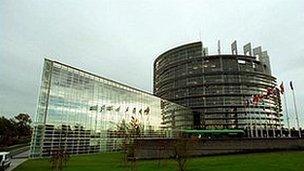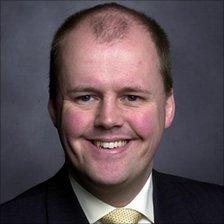France-UK row over Strasbourg parliament escalates
- Published

The regular commute to Strasbourg remains a sore point for many MEPs
British Euro MPs want the UK government to back them in a dispute with France over the number of European Parliament sessions held in Strasbourg.
France insists that MEPs must stick to the 12 Strasbourg sessions a year that are required by the EU's Lisbon Treaty.
But in March a majority of MEPs voted to squeeze two of the sessions into one week, to reduce the huge cost of shuttling from Brussels to Strasbourg.
France objected and has asked the EU's top court to overrule the vote.
The Strasbourg shuttle is estimated to cost 203m euros (£177m; $286m) a year. British MEPs have branded it a "travelling circus".
Ending the shuttle could cut 20,268 tonnes of CO2 emissions annually, the Green Party says.
But changing the EU treaty would require the unanimous agreement of all 27 member states' governments. It is not clear how many would back France in the dispute.
One-seat campaign
The coalition agreement between the UK Conservatives and the Liberal Democrats pledges "we will press for the European Parliament only to have one seat, in Brussels".
A UK Foreign Office spokesperson told the BBC that "the government of course raises this significant issue with colleagues as appropriate".
The MEPs' amendment on the calendar change was passed by secret ballot and got a majority of 104.

Ashley Fox is leading the charge in Europe to stop the Strasbourg shuttle
Conservative MEP Ashley Fox, who organised the vote, said "we'll request again that they [the UK government] intervene on behalf of all the taxpayers of Europe".
The regular Strasbourg shuttle "distances the EU from the citizens", he told the BBC. "Having two parliaments is utterly ridiculous."
But in its objection, lodged on Tuesday at the European Court of Justice, France said the parliament's vote "in reality amounts to getting rid of one of the 12 monthly sessions".
It said the vote breached Protocol 6 in the Lisbon Treaty, which states that the parliament "shall have its seat in Strasbourg where the 12 periods of monthly plenary sessions, including the budget session, shall be held".
"The periods of additional plenary sessions shall be held in Brussels," it states.
Business opportunities
Strasbourg stands on the Rhine, facing Germany, and for decades France has defended the city's EU role as a symbol of post-war unity and friendship.
The regular visits by MEPs, parliament staff, journalists and lobbyists provide significant income for Strasbourg hotels, restaurants and other services.
The MEPs' vote changes the parliament's schedule for 2012 and 2013, fitting two full sessions into one week in October. Normally each session lasts four days, but under the new plan two sessions would be cut to two days each.
French MEPs in the centre-right European People's Party - the main grouping in the parliament - voiced outrage, saying the vote had been conducted "anonymously, without political courage" by MEPs who just wanted to "attack the Strasbourg seat".
"Strasbourg is a highly symbolic place which embodies European reconciliation," they said.
Earlier, France's Europe Minister Laurent Wauquiez criticised his UK counterpart David Lidington for having supported the MEPs' vote. Mr Wauquiez called it "an unfriendly and aggressive gesture towards France".
Soon after the vote, the leader of the UK Conservatives in Europe, Martin Callanan, and his Lib Dem counterpart, Fiona Hall, sent a joint letter to 10 Downing Street on behalf of British Euro MPs, expressing pride in the result.
Prime Minister David Cameron and his Lib Dem deputy Nick Clegg congratulated them, saying: "We were delighted to hear about the outcome of the vote on 9 March which, as you state, seems to demonstrate a genuine change of sentiment among MEPs in favour of a single seat in Brussels."